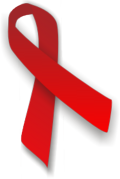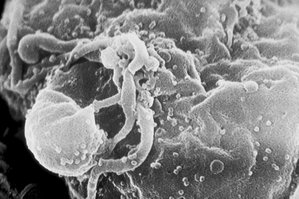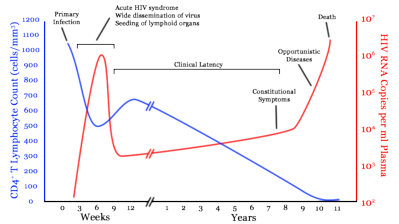AIDS
Acquired immunodeficiency syndrome, or acquired immune deficiency syndrome (or acronym AIDS or Aids), is a collection of symptoms and infections resulting from the specific damage to the immune system caused by infection with the human immunodeficiency virus (HIV). It results from the latter stages of advanced HIV infection in humans, thereby leaving compromised individuals prone to opportunistic infections and tumors. more...
Although treatments for both AIDS and HIV exist to slow the virus' progression in a human patient, there is no known cure.
Most researchers believe that HIV originated in sub-Saharan Africa during the twentieth century; it is now a global epidemic. UNAIDS and the World Health Organization (WHO) estimate that AIDS has killed more than 25 million people since it was first recognized on December 1, 1981, making it one of the most destructive pandemics in recorded history. In 2005 alone, AIDS claimed between an estimated 2.8 and 3.6 million, of which more than 570,000 were children. In countries where there is access to antiretroviral treatment, both mortality and morbidity of HIV infection have been reduced . However, side-effects of these antiretrovirals have also caused problems such as lipodystrophy, dyslipidaemia, insulin resistance and an increase in cardiovascular risks . The difficulty of consistently taking the medicines has also contributed to the rise of viral escape and resistance to the medicines .
Infection by HIV
AIDS is the most severe manifestation of infection with HIV. HIV is a retrovirus that primarily infects vital components of the human immune system such as CD4+ T cells, macrophages and dendritic cells. It also directly and indirectly destroys CD4+ T cells. As CD4+ T cells are required for the proper functioning of the immune system, when enough CD4+ cells have been destroyed by HIV, the immune system barely works, leading to AIDS. Acute HIV infection progresses over time to clinical latent HIV infection and then to early symptomatic HIV infection and later, to AIDS, which is identified on the basis of the amount of CD4 positive cells in the blood and the presence of certain infections.
- For more details on this topic, see HIV.
In the absence of antiretroviral therapy, progression from HIV infection to AIDS occurs at a median of between nine to ten years and the median survival time after developing AIDS is only 9.2 months . However, the rate of clinical disease progression varies widely between individuals, from two weeks up to 20 years. Many factors affect the rate of progression. These include factors that influence the body's ability to defend against HIV, including the infected person's genetic inheritance, general immune function , access to health care, age and other coexisting infections . Different strains of HIV may also cause different rates of clinical disease progression.
Read more at Wikipedia.org




